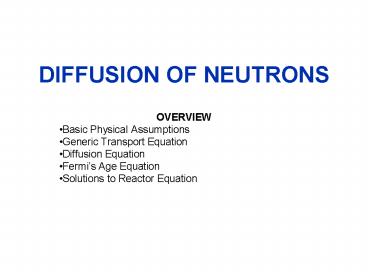DIFFUSION OF NEUTRONS - PowerPoint PPT Presentation
1 / 57
Title:
DIFFUSION OF NEUTRONS
Description:
Neutrons are dimensionless points. Neutron neutron interactions are ... Non-fissile abs. Fission. Slowing down. Energy. E. 2 MeV. 1 eV. 200 MeV/fission. ? 2.5 ... – PowerPoint PPT presentation
Number of Views:250
Avg rating:3.0/5.0
Title: DIFFUSION OF NEUTRONS
1
DIFFUSION OF NEUTRONS
- OVERVIEW
- Basic Physical Assumptions
- Generic Transport Equation
- Diffusion Equation
- Fermis Age Equation
- Solutions to Reactor Equation
2
Basic Physical Assumptions
- Neutrons are dimensionless points
- Neutron neutron interactions are neglected
- Neutrons travel in straight lines
- Collisions are instantaneous
- Background material properties are isotropic
- Properties of background material are known and
time-independent
3
(No Transcript)
4
(No Transcript)
5
Initial Definitions
6
(No Transcript)
7
Angular Flux and Current Density
J
dS
8
Generic Transport Equation
Arbitrary volume V
We ignore macroscopic forces
9
Generic Transport Equation
Gauss Theorem
10
Substantial Derivative
z
r
y
x
11
Transport (Boltzmann) Equation
12
Collision Term
z
r
y
x
13
Neutron Transport Equation
14
Boundary Condition
Outgoing direction
Outward normal
O
Incoming direction
ns
r
Volume V
O
Rs
Surface S
V
15
Delayed Neutrons
16
Difficulties
- Mathematical structure is too involved
- Mixed type equation (integro-differential), no
way to reduce it to a differential equation - Boundary conditions are given only for a halve of
the values - Too many variables (7 in general)
- Angular variable
17
Angular Measures
180 Solar disks
18
Plane Angles
R
f
19
Solid Angles
20
One-Group Diffusion Model
- Infinite homogeneous and isotropic medium
- Neutron scattering is isotropic in Lab-system
- Weak absorption Sa ltlt Ss
- All neutrons have the same velosity v. (One-Speed
Approximation) - The neutron flux is slowly varying function of
position
21
Derivation
Number of collisions in dV
Neutrons scattered towards dA
Neutrons through dA per 1 second
22
Taylors series at the origin
23
(No Transcript)
24
Ficks Law
CM-System ? Lab-System
25
Transport Mean Free Path
Y
Y
Y
lscosY
lscosY2
ls
ltr
26
Diffusion Equation
27
Leakage Rate
z
Jz
dz
dx
(x,y,z)
dy
y
x
28
Diffusion Equation
Time-dependent
Time-independent
Time-independent from a steady source
29
Laplaces Operator
Cartesian geometry
Cylindrical geometry
Spherical geometry
n 0 for slab n 1 for cylindrical n 2 for
spherical
30
CONDITIONS 1. The neutron flux finite and
non-negative. 2. F - symmetric if there is any
symmetry in the system 3. Boundary conditions
for interface between two different media
neutron flux and neutron current density are
continuous 4. No return from a free surface -
the flux becoming zero at extrapolated length.
31
(No Transcript)
32
Boundary Condition
Transport eq.
Free surface
Diffusion eq.
Straight line extrapolation from x 0 towards
vacuum
33
Plane Infinite Source in Infinite Medium
Transport equation
Q0
x 0
34
Point Source in Infinite Medium
r
35
Plane Infinite Source in Slab Medium
Infinite
Q0
Slab
x 0
x a/2
x -a/2
36
Plane Infinite Source with Reflector
Q0
1
2
2
1
Reflector
Reflector
a
Bare slab
37
Age of Neutrons
Energy
- q(E) - number of neutrons, which per
cubic-centimeter and second pass energy E. - q(E) ncm-3 s-1
- X-sections depend on E D(E),Ss(E),...
Q
E0
q(E)
E
Slowing down medium
38
Fermis Age Equation
EdE
q(EdE)
E
q(E)
39
Fermis Age Equation (cont)
40
Solutions to the Age Equation
No absorption
x 0
r
No absorption
41
Slowing Down Density for Different Fermis Ages
42
Migration Area (Length)
Thermal neutron absorbed
Fast neutron borne
r
rs
rth
Fast neutron thermalized
43
Diffusion and Slowing Down Parameters for Various
Moderators
44
Neutrons in Multiplying Medium
Assumption
45
Principles of a Nuclear Reactor
Leakage
E
N2
2 MeV
N1
Fast fission
n n/fission
Energy
Slowing down
Resonance abs.
? 2.5
Non-fuel abs.
Non-fissile abs.
1 eV
Fission
200 MeV/fission
Leakage
46
(No Transcript)
47
(No Transcript)
48
Criticality Condition
49
Solution of a Reactor Equation
50
(No Transcript)
51
Rectangular
Cylinder
Sphere
52
Critical Size of a Reactor
We assume bare homogenous reactor For thermal
neutrons we get
Slowing down neutrons
Assumption Reactor is sufficiently big to treat
neutron spectrum independently of space variables
At the beginning slowing down density is t0
53
For t gt 0 one has to take into account resonance
capture through p resonance passage factor.
54
Volume of an cylindrical reactor with buckling
derived from a critical equation the smallest
critical size
55
(No Transcript)
56
CRITICALITY EQUATION - physical interpretation
57
Thermal leakage
Thermal non - leakage factor































